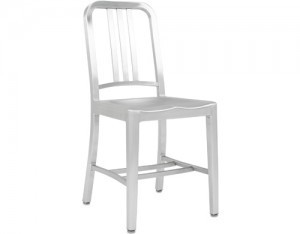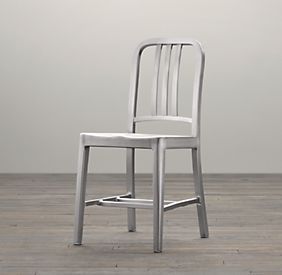Can Emeco prevent Restoration Hardware from knocking off the “Navy Chair”?
 The Emeco 1006 chair, also called the “Navy Chair”, is an aluminum chair produced by the Electric Machine and Equipment Company (Emeco) in Hanover, Pennsylvania. The chair, pictured at left, was commissioned in the 1940s by the United States Navy in World War II for use on warships: the contract specified that it had to be able to withstand torpedo blasts to the side of a destroyer.
The Emeco 1006 chair, also called the “Navy Chair”, is an aluminum chair produced by the Electric Machine and Equipment Company (Emeco) in Hanover, Pennsylvania. The chair, pictured at left, was commissioned in the 1940s by the United States Navy in World War II for use on warships: the contract specified that it had to be able to withstand torpedo blasts to the side of a destroyer.
After the war, Emeco began selling its Navy Chair to the public. The chair never sold particularly well, but over the years Emeco’s chair carved out a small niche as a piece of high-end (that is, expensive) design of the sort you’ll see featured in Dwell magazine.
 Until Restoration Hardware got into the act. Recently the big furniture retailer began selling a Navy look-alike chair (pictured at left), which it (now) refers to as the “standard aluminum side chair”. (It previously referred to it as the “Naval Chair”). The Emeco original is $455.00. The Restoration knockoff is $129. At that price — and given Restoration Hardware’s ubiquity and marketing muscle — the Navy Chair is poised to go mainstream.
Until Restoration Hardware got into the act. Recently the big furniture retailer began selling a Navy look-alike chair (pictured at left), which it (now) refers to as the “standard aluminum side chair”. (It previously referred to it as the “Naval Chair”). The Emeco original is $455.00. The Restoration knockoff is $129. At that price — and given Restoration Hardware’s ubiquity and marketing muscle — the Navy Chair is poised to go mainstream.
Which Emeco is not going to take sitting down. The company has now filed suit, accusing Restoration Hardware of trademark infringement and counterfeiting. Does the suit have any merit?
Probably not. Emeco probably cannot claim a trademark in the term “Navy Chair”, because that is likely a generic description of this type of all-metal, 1940s-style chair, rather than a name that serves as any indicator of a particular source of the chair in question. (And in any event Restoration Hardware isn’t using the name anymore . . .)
Emeco’s claim for trademark rights in the chair’s design probably fails for similar reasons. The Supreme Court has made clear that firms can claim trademark rights (referred to as “trade dress”) in the design of products only if that design is recognized by consumers as a signal of the product’s source. So, for example, the sinuous design of a Coca-Cola bottle is protected because people widely recognize a bottle of that shape as signaling “Coke”. Is the design of Emeco’s Navy Chair sufficiently familiar that it indicates source to a substantial number of consumers? Unlikely.
We’ll see how the case turns out, but it will suffice for now to note that in the world of furniture — as in fashion, food, financial innovations, and the many other industries we cover in The Knockoff Economy — there are a lot of knockoffs, and a lot of them are perfectly legal. Does the freedom to knock off designs mean that creativity grinds to a halt? Not that we can see.



